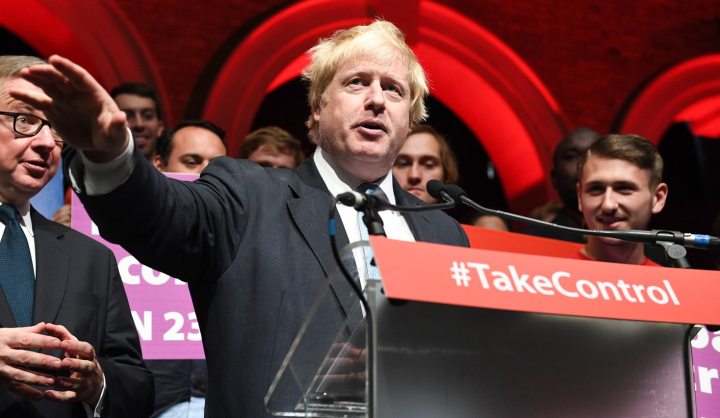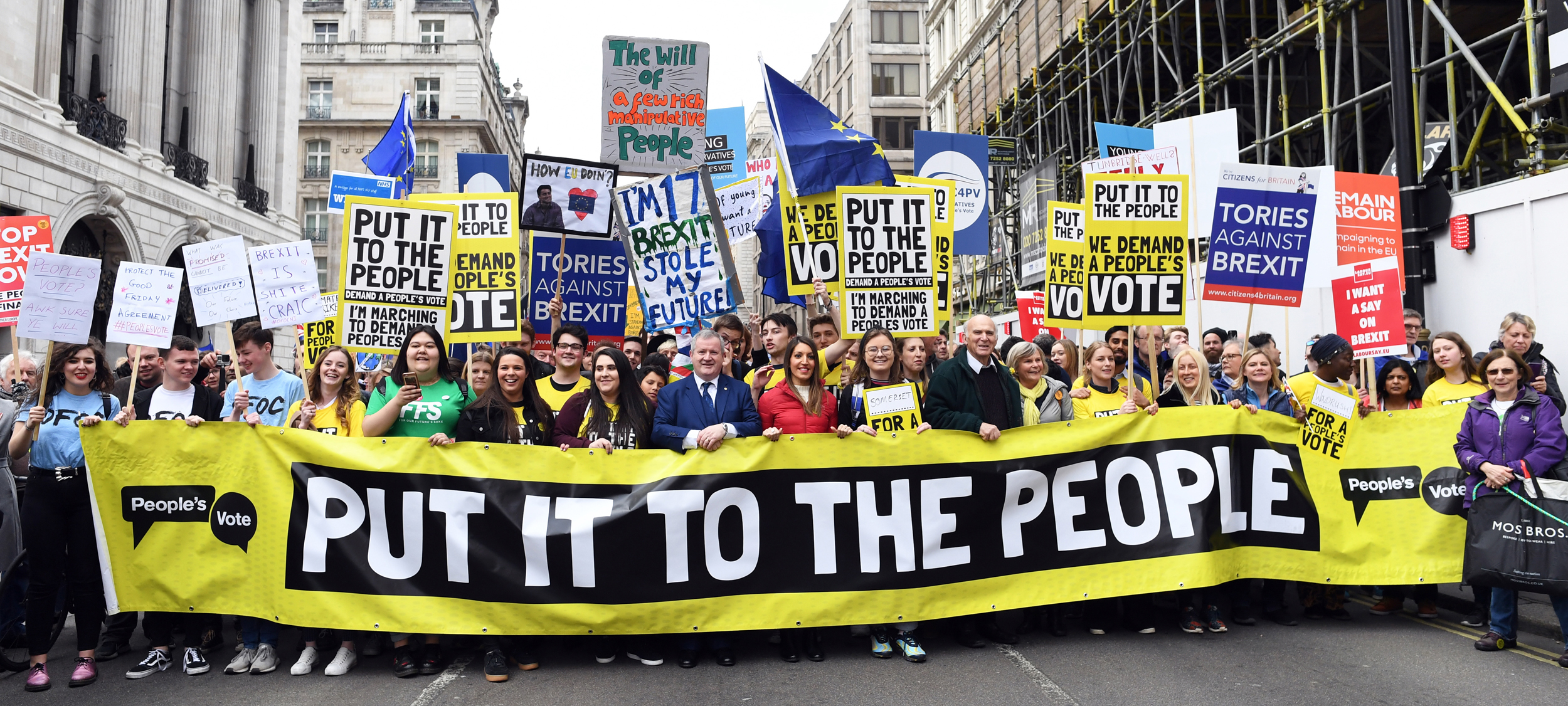BRITAIN AND THE EUROPEAN UNION
Brexit: Now that it is all settled they must get to work and figure out what they’ve done

After years of political warfare in Britain over membership in the EU, followed by that infamous referendum, and then more years of painful negotiations with the EU, the UK is finally free of its evil clutches. Or something. The moral of this tale clearly is: Be careful what you wish for!
It now seems like a distant time, just after the legendary Arthurian era, a curious puzzle of a bygone age, an ancient era before Brexit. But, then, after a rancorous referendum campaign, the British citizenry narrowly voted in favour of their country’s voluntary disassociation from the European community, after two generations of membership and much better, more varied food on offer in London restaurants.
But, then, in the years that have followed the referendum, there were those torturous negotiations with the EU over topics almost certain to put insomniacs into a profound sleep.

Protesters at a ‘Put it to the People’ march in London, Britain, 23 March 2019. Hundreds of thousands of people took part in the protest calling for a referendum on the final Brexit deal. (Photo: EPA-EFE / Facundo Arrizabalaga)
Then, finally, there was the triumphant (or exhausted, perhaps) announcement the two sides had reached agreement on the terms of the end of their relationship. It would be a reasonable, amicable divorce, rather than an international level remake of the film, The War of the Roses. All except for one thing. It turns out that the unsorted features of their relationship still continue to be a minefield.
Perhaps this is because John Donne really was right; no one, not even Britain, is entirely an island, neither metaphorically nor physically. Besides the reality of the Channel Tunnel, there was all that trade, there had been all those movements of people from house painters, to pastry chefs, to 4IR specialists and highly specialised, analytical finance whizzes heading for London and beyond, and all those millions of manufactured goods whose sub-assemblies often travel between Britain and the continent multiple times until they are actually finished products. Think Airbus planes, just for one.
For months it seemed that the ongoing horrors of the Covid-19 pandemic and its deep economic impact on Britain, and the nearly daily reports of death, the problems and progress in vaccine development and rollout issues with the vaccines, with hospitals overwhelmed by Covid patients, healthcare staffers working flat-out to deal with the growing totals of those very sick patients were the only thing in the news.
But then, suddenly, global television screens and online news channels were now filling up with an entirely different story, separate from the agonies of Brexit. This was the astonishing imagery of multitudes of stationary caravans of lorries, stretching for kilometres, waiting to enter or leave the island nation.

Trucks queue outside the Manston Airport Inland Border facility near Ramsgate, UK, on Thursday, 28 January 2021. (Photo: Jason Alden / Bloomberg)
News footage carried interviews with drivers trapped in those stalled queues in the days right before Christmas, without food, rest stops, warm shelters, or even any sense that they would get home to their families across Europe, before the holidays. This was newsworthy without even considering the business costs from lost time due to idled trucks and drivers, spoiled produce, or other fresh items now past their “sell-by” labelled dates, or foregone sales.
Simultaneously, viewers were also treated to scenes of British food stores suddenly showing empty spaces on shelves where the holiday goodies should have been heaped up in overflowing abundance. As an added attraction, there were also interviews with and actualities of doughty British fishermen, usually identified as fourth or fifth generation, hardy fisherfolk, explaining — as they sorted their catches — that the new export regimen from Brexit is crushing them with new fees and a blizzard of paperwork. One man was shown brandishing a live lobster (with its claws shut with rubber bands), saying this whole business “stinks” since the crustacean and mollusc catches either arrive in their European markets alive — or it is a dead loss. Literally. After all, delays in shipping live sea creatures can kill them — and the shippers’ markets as well.
These kinds of outcomes were certainly not how the proponents of Brexit had imagined their policy gamble would pan out in terms of its management and administration, or how their beloved Brexit would lead to astonishing benefits for Britons.
In fact, the entire notion was actually premised on an unproven philosophical-political idea: Britain had no business being enmeshed in the miasmic confusion of Brussels, and that Britain really was a different kind of place than those beehives on the continent where those inscrutable — even mendacious — bureaucratic regimens would even regulate the acceptable size and curve of a banana, if they could.
Instead, Brexit was for the proud British people after all; none of that nonsense about the virtues of a cosmopolitan integration of a global kitchen serving bizarre, mixed cuisines. And so, thank you, Dominic Cummings, Michael Gove, Nigel Farage, and all the rest of their ilk who participated in this bait-and-switch rhetoric.
So, right now is the time to cue your favourite over-the-top Gilbert and Sullivan patriotic chorus from HMS Pinafore to get the flavour of this balderdash in all its ethnic glory:
He is an Englishman!
For he himself has said it,
And it’s greatly to his credit,
That he is an Englishman!
For he might have been a Roosian,
A French, or Turk, or Proosian,
Or perhaps Itali-an!
But in spite of all temptations
To belong to other nations,
He remains an Englishman!
He remains an Englishman!
For in spite of all temptations
To belong to other nations,
He remains an Englishman!
(And sing along — you know you want to — with this chorus while watching: H.M.S. Pinafore: He is an Englishman)
And besides, so their faux argument went, all those exorbitant payments to those faceless bureaucrats with their indecipherable rules and fancy meals on the public tab (your hard-earned money paid in taxes and then transferred to the EU) could be better kept at home to help support the country’s beloved National Health Service, an institution that could really use the money. There would be a huge disassociation from the EU dividend, if only the British people were brave enough to hang their courage on the sticking post or whatever.
And so, in the referendum, they did so in small villages and rural areas in much (but not all) of the country, in coastal towns dependent on retiree pensions, and among people who had never quite gotten comfortable with the idea that Britain should be part of some strange thing called Europe – with all its “furrin languages”, the tumult of strange accents in the city, and Polish plumbers and Hungarian bricklayers.
Instead, there was the faded nostalgia of the Empire, the Commonwealth, and of the UK’s sacred “Special Relationship with America”. This latter was first enunciated by Winston Churchill in his famous Fulton, Missouri speech, way back in 1946, in the still-fresh memory of that great crusade in Europe to save the beleaguered continent from itself.
But what they ended up with, of course, was something rather different. Three years of torturous negotiations of the unwinding of Britain’s integration into the EU, endless fights over the possibility of a hard border, a squishy soft one or nothing at all between Northern Ireland and the Republic of Ireland (given the deep integration of the two economies over the past several decades and Ireland’s continuing membership in the EU), endless squabbles over fishing rights, and so much else.
Most depressing, perhaps, has been the fact that so far at least, the British haven’t even got that hoped-for prize from the Americans of a new, special free trade association – at least until the British figured out how to finish their negotiations with the EU.
Most especially, the Americans muttered, there needed to be absolute clarity that the final settlement would not disrupt that carefully constructed political settlement in Northern Ireland (which the Americans had had a significant hand in) — something that was itself dependent upon an open, easy passage between the two halves of the island. Ouch.
Commenting on the realities of the UK-EU relationship, post-Brexit, rather than repeating the daydreams of the Brexiters, The Financial Times noted, “Six weeks after Brexit became a reality, Britain’s new relationship with the EU has already run into trouble.
Trade has been disrupted, border tensions have flared in Northern Ireland, City of London business has leached across the North Sea to Amsterdam and the two sides are locked in a stand-off after Britain refused to grant full diplomatic status to the EU embassy in London.
“ ‘When an aeroplane takes off, you sometimes get an increased level of turbulence,’ Michael Gove, a leading Brexiter UK cabinet minister, told parliamentarians this month, with studied understatement. Eventually the crew tell you to take your seat belts off, and enjoy a gin and tonic and peanuts. We’re not at the gin and tonic and peanuts stage yet.’
“One EU official wonders what Gove expected from Brexit: ‘The UK pilot may have had a few G&Ts before taking off.’ ” In other words, he has been talking specious nonsense.
Rather than the crisp, clean termination of relationship negotiators had thought they had been heading towards, a sombre reality is coming clear, that the formal agreement is just the beginning of a long, drawn-out process. As the FT went on to explain, “Six weeks in, they have still not decided what sort of divorce they want – whether it will be a cordial separation or a rolling series of confrontations. ‘Is there going to be healthy competition or will you end up in all-out confrontation and conflict? It’s not clear which way it will go,’ says Maddy Thimont Jack, Brexit expert at London’s Institute for Government.

Tower Bridge and skyscrapers in the City of London on Monday, 18 January 2021. Britain’s divorce deal barely touches banking and trading, and Europe is eager to develop its own financial centre.
“The detailed operation of the new EU/UK trading relationship has yet to be settled, along with the operation of the sensitive post-Brexit deal in Northern Ireland. Issues including financial services are still unresolved. In Brussels a pessimistic mood has descended in recent weeks, amid concerns that relations will get more difficult before they improve. ‘This will get messy,’ says one EU diplomat. There is a feeling towards London that ‘you wanted this — this is your problem and you can solve it yourself’.
“Maros Sefcovic, European Commission vice-president, has proposed setting up an emergency hotline to London to handle emerging Brexit tensions in Northern Ireland, but the introduction of this Cold War concept hints at how far the two sides have already grown apart.
“One senior EU official says: ‘There has to be a wish to change things. If not, we will be in a tough, “permanent alert” situation. It would be unfortunate if there was a tit-for-tat relationship.’ Officials in Downing Street and Brussels agree that a fractured relationship between the leading democracies of Europe will be welcomed in Moscow and Beijing. ‘Others will capitalise on that,’ the EU official says. ‘There’s a lot at stake here.’ ”
It is true British Prime Minister Boris Johnson has been increasingly clear there would be “teething problems” after 1 January, when the UK’s post-Brexit transition period ended and the two sides were then left with sorting out the inner meanings of the “trade and cooperation agreement”, signed the day before Christmas, but few expected the downhill slide would be so quick into fractiousness. Or, as David Frost, Johnson’s Brexit negotiator, told a House of Lords committee, “I think the EU is still adjusting somewhat to the existence of a genuinely independent actor in their neighbourhood.”
In fact, that so-called “Canada-style” free trade deal agreed to by Johnson and Ursula von der Leyen, European Commission president, has left many details of the new trading relationship up in the air, particularly since the deal placed political sovereignty over market access. It is true that most goods would continue to move between the two sides without tariffs, but Johnson’s decision to quit the single market and customs union has meant trade is hit by messes of paperwork and border checks – just as those hearty fisherfolk were complaining about.
Free movement of people would end and details of the new circumstances for financial services have been barely covered. Not surprisingly, the City is losing business to big European financial sectors – as Amsterdam has surged past London as the continent’s main share trading hub.
And, of course, these new requirements don’t just affect lobsters, Dover sole, and halibut. Performing artists are also complaining European tours (at least the ones that will come about post-Covid) will become unviable because of the new applicability of new EU work and travel regulations.
As The Guardian reported on this aspect of things, “The National Theatre is shelving plans to tour productions to mainland Europe due to uncertainty over work permits because of Brexit. Before travelling to work in a number of EU countries, many working in the arts will now need to apply for short-term work permits.
“A spokesperson for the theatre said it had planned to take its production of The Curious Incident of the Dog in the Night-Time to venues in Europe, but the tour had been postponed as a result of Covid. ‘We hope to resume European touring. However, we’re currently unable to make firm plans because of Brexit legislation; the potential additional costs for visas and current uncertainty around social security contributions mean regrettably it is currently not financially viable,’ the spokesperson said.”
And UK chemicals manufacturers have begged the relevant ministers not to slap what they say would be a £1-billion (R20.54-billion) bill on their industrial sector by making them replicate EU registration of substances on a new UK register. Even Covid has entered into the contretemps with the unilateral activation of the Article 16 override clause (part of the Northern Ireland protocol) which the FT observed could even lead to public unrest in the absence of sufficient vaccines.
Prime Minister Johnson’s restraint in this particular case could be, as the FT reported it, “partly explained by Johnson’s fear of a ‘vaccine war’ – threatening supplies of the BioNTech/Pfizer vaccine to the UK from a plant in Belgium – but it was also seen by senior British officials as a sign that a new team of ‘grown ups’ in Number 10 were exerting a moderating influence over the prime minister” now that Dominic Cummings, architect of the Vote Leave victory in 2016”, was no longer Johnson’s chief adviser. Still, the UK response on the vaccines hardened anyway, as Gove demanded a special grace period on the Northern Ireland/Ireland trade border for two more years, along with his rhetoric about “integrationist theology”.
In sum, the UK government seems to be having a difficult time shifting from its earlier campaign rhetoric to the harder, grittier work of thoughtful, considered, measured diplomacy. But the UK government has even – so far – taken a kind of populist fervour to its diplomacy, failing to grant diplomatic status to the EU’s mission to the UK. Well, heck, they aren’t a country, are they?
The FT then concluded, “In the coming months, the unfinished business of the hurried Christmas Eve trade deal will rise up the political agenda, including the detailed management of the deal, and the full implementation of the new trade border. Other issues still up for grabs include airline ownership rules, data protection and financial services.” There is lots left to do in what was supposed to have been sorted out long ago from the deal that was struck.
But the FT went further to say, “Britain’s political discourse – defined by decades of Euroscepticism – does not lend itself to measured compromise. Whether the new relationship is marked by healthy competition or destructive regional rivalry is up for grabs, although the early signs are not good. João Vale de Almeida, the EU’s ambassador to London, insists both sides must rise to the challenge: ‘We need to move on. There’s life after Brexit.’”
Well, there had better be, for the sake of all those doughty fishermen, the actors and theatregoers, those lorry drivers, manufacturers, investors, financial analysts, and everybody else – including the consumers on both sides of the Channel. DM



















 Become an Insider
Become an Insider
It is a chaotic mess, perhaps that was the plan all along!
I think this is a negative article. Just compare the GB rollout of the Covid vaccination programme against that of the EU. this success was thanks to Brexit.